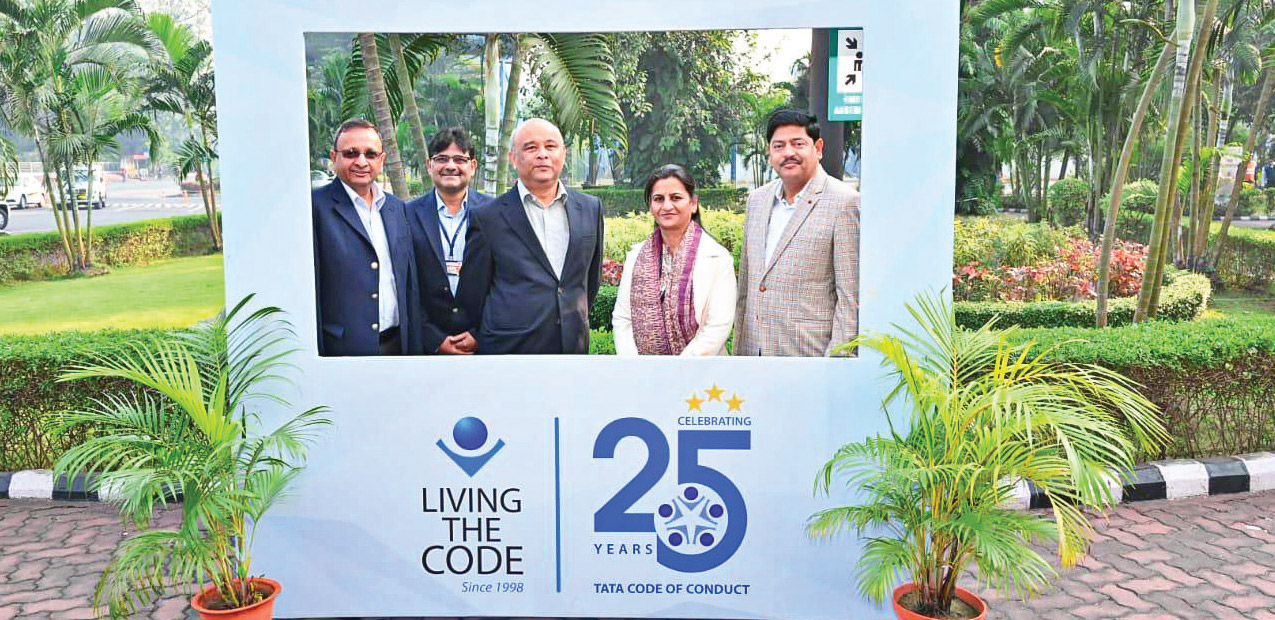Ethics
Ethical business conduct forms
the core of Tata Steel’s philosophy.
The Company has always upheld the
highest standards of ethical business
practices across its geographically
diversified operations.
On December 18, 2023, Tata Steel
observed 25 years of institutionalising
the Tata Code of Conduct (TCoC).
Guided by the TCoC, Tata Steel has
deployed the Management of Business
Ethics (MBE) framework with the
following four pillars:
Leadership
- The Corporate Governance structure
includes Board-level committees
and management-level committees,
which oversee the deployment of
vigil mechanism in the organisation.
- The Senior Leadership team does
role modelling by communicating
the values and principles through
various forums, addressing different
stakeholders across divisions
thereby ensuring open and
transparent culture.
- The Chief Ethics Counsellor (CEC)
is responsible for driving MBE
initiatives and reports to the Chief
Executive Officer & Managing
Director (CEO & MD), who is also
the Principal Ethics Officer. Apart
from a dedicated Corporate Ethics
department, the deployment is
supported by line managers and
employees who are nominated
and trained as Divisional Ethics
Coordinators and Ethics Champions
and constitute the Organisation of
Ethics Counsellors (OECs). Besides
them, local POSH (Prevention of
Sexual Harassment) representatives
play a pivotal role in connecting with
and instilling confidence among
the people on shop floors and
supporting them in reporting sexual
harassment cases.
Compliance structure
- Various systems and processes
are used to ensure a robust vigil
mechanism for the deployment of
the TCoC and related policies in the
organisation.
- Tata Steel’s in-house IT-enabled
digital platform ‘Darpan’ hosts
declarations on the TCoC and
Conflict of Interest, external
assignment declarations, and Gift
and Hospitality declarations. Other
key IT platforms used by Tata Steel
are the Management of Business
Ethics Information System for
Ethics Counsellor Management, the
dilemma portal called ‘Kashmakash’,
and the Integrated Concern
Management System.
- Tata Steel also has a third-party
whistleblowing helpline facility
called ‘Speak Up’, which ensures
stakeholders’ confidence in the
whistleblowing process. The
facilities include a 24/7 toll-free
number, web access, postal services,
and email.
Communication and training
- Communication is crucial in
deploying the MBE framework
across the organisation through
various communication platforms,
including round-table discussions
for employees, business associate
meets for vendors, distributors,
suppliers, transporters, and service
providers, and mass meetings at
shop floors to connect with the
frontline employees and contract
workforce.
- Customised training programmes
on POSH, Respectful Workplace, and
Third-Party Due Diligence, amongst
other topics, are conducted online,
in classrooms, and on web-based
mediums.
Measurement
The activities of the OECs are
captured in the online Management of
Business Ethics Information System.
The effectiveness of the MBE
framework deployment is constantly
evaluated using the feedback from the
MBE Survey and MBE Assessment.
Tata Steel has and will
always relentlessly focus on
strengthening the ethical
culture across all its locations
by reinforcing the policies
and guidelines, setting high
standards of transparency
through strong corporate
governance practices, and
leveraging technology.
Compliance
The steel industry, historically
a bastion of rigorous regulatory
oversight and scrutiny, finds itself
at a pivotal juncture as the global
imperative shifts towards sustainability
and decarbonisation. Additionally,
significant stakeholder expectations,
shifts in social attitudes, and public
perception, particularly in the
Environmental, Social and Governance
(ESG) domain, are shaping industry
practices and priorities. Given this
shift, compliance is at a critical
inflexion point as it transcends the
traditional boundaries of regulatory
adherence and legal conformity.
Compliance is now emerging as
a strategic function that serves as
a cornerstone in supporting the
trajectory of the enterprise towards a
sustainable future.
The Compliance function at
Tata Steel involves a robust and
comprehensive programme that
focuses on regulatory changes
and trends, addresses stakeholder
expectations, and facilitates
continuous improvement while
aligning with the Company’s strategic
objectives and values. It plays a
pivotal role in fostering a culture that
is anchored in integrity, transparency
and accountability and prioritises
fairness, upholds rights, promotes
safety, and advocates ethical conduct.
Acting as a second line of defence,
it assesses compliance gaps, guides
the implementation of internal
controls, and provides critical insights
to the management. In addition to
ensuring adherence to a myriad of
applicable laws and regulations, the
function serves as a valued advisor,
providing essential guidance, training,
and consultation to the business in
meeting its compliance obligations.
Last year, the function achieved
ISO 9001:2015 standards certification,
incorporating rigorous quality
management in its compliance
practices, crucial for meeting
contemporary and ever-evolving
regulatory demands effectively. This
achievement marks a significant stride
in propelling the function towards
sustained operational excellence. It is
also significant in light of the function’s
aspiration to secure ISO 37301:2021
standards certification in the
coming years.
Recognising the importance of
technology in driving compliance,
the function prioritised automating
compliance processes to streamline
operations, reduce manual effort and
minimise human error. Automation
was utilised for user follow-ups and
generating management reports. The
function also introduced modules
to its compliance solution for
streamlining compliance procedures
on user concern management and
statutory licences review.
In FY2024-25, the focus would
be on enhancing review and testing
protocols through compliance audits
to assess gaps, ensure coverage,
promote awareness, and foster a
compliance culture.
In the coming years, the function
will continue to develop compliance
capabilities across all levels within
Tata Steel and across the corporate
spectrum, which includes group
entities. It will look to extend its
monitoring and oversight perimeter
to include third parties. It would
continue to evaluate and upgrade its
technology stack to ensure it meets
the emerging compliance demands.
The function is headed by the
Company Secretary and Chief Legal
Officer (Corporate & Compliance), who
is primarily responsible for overseeing
and managing regulatory compliances.
The function is adequately staffed
with compliance managers who are
responsible for establishing business
and industry-specific standards in all
units across the organisation.
ISO 9001:2015
Certification received by
the Compliance function during
FY2023-24
